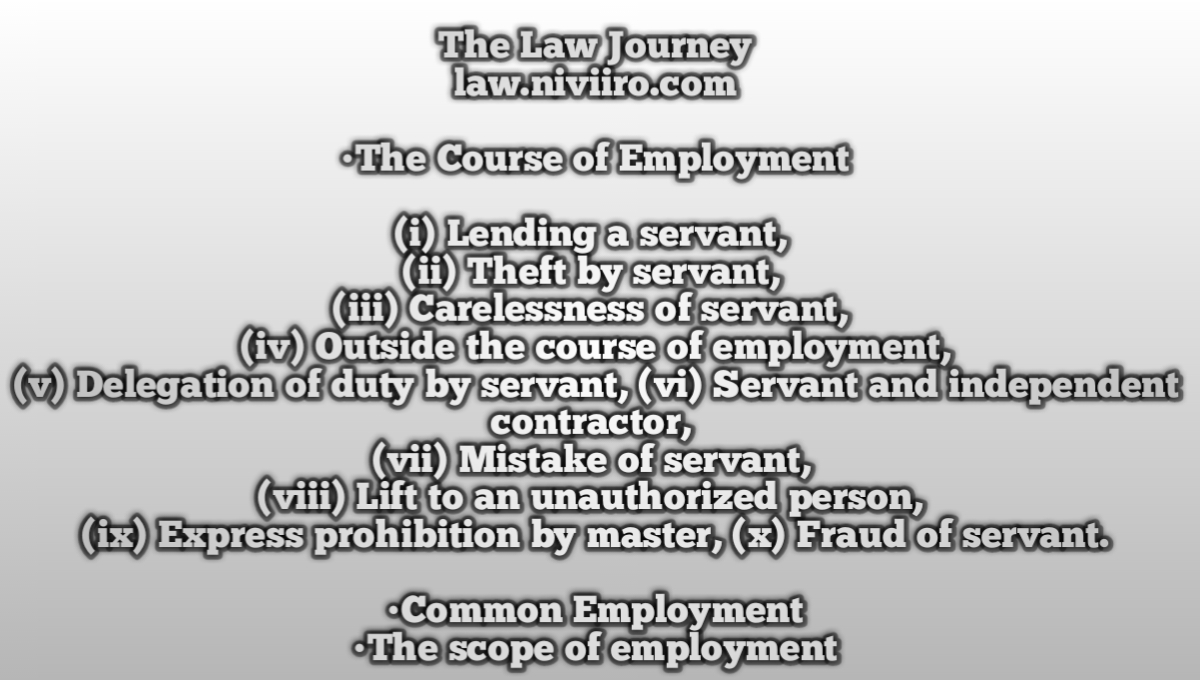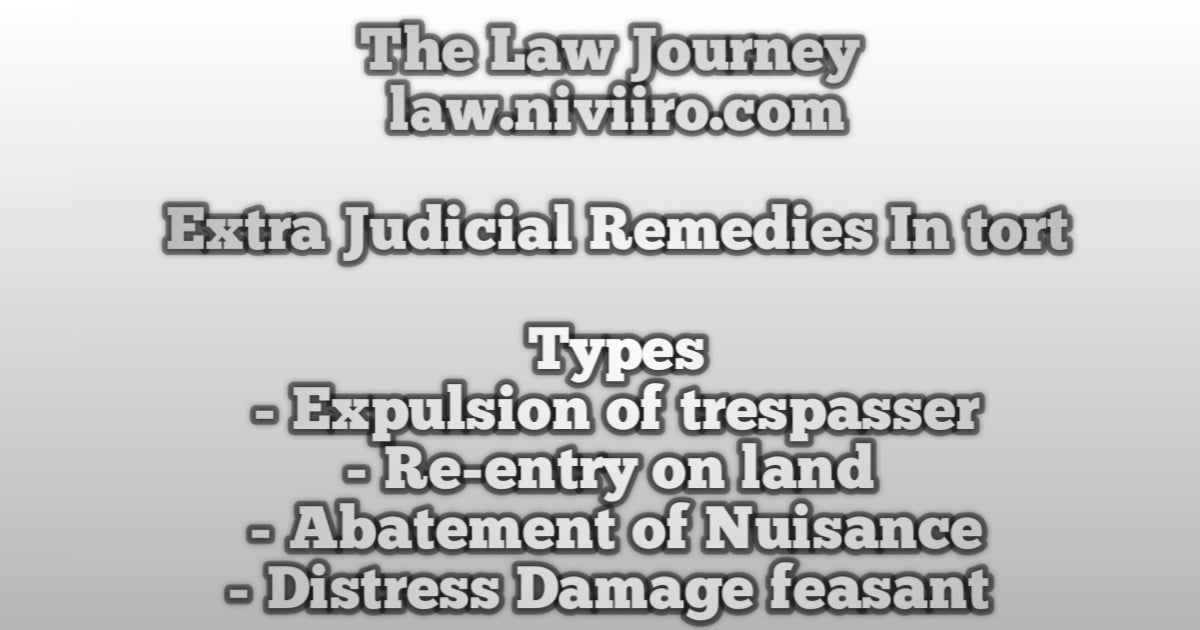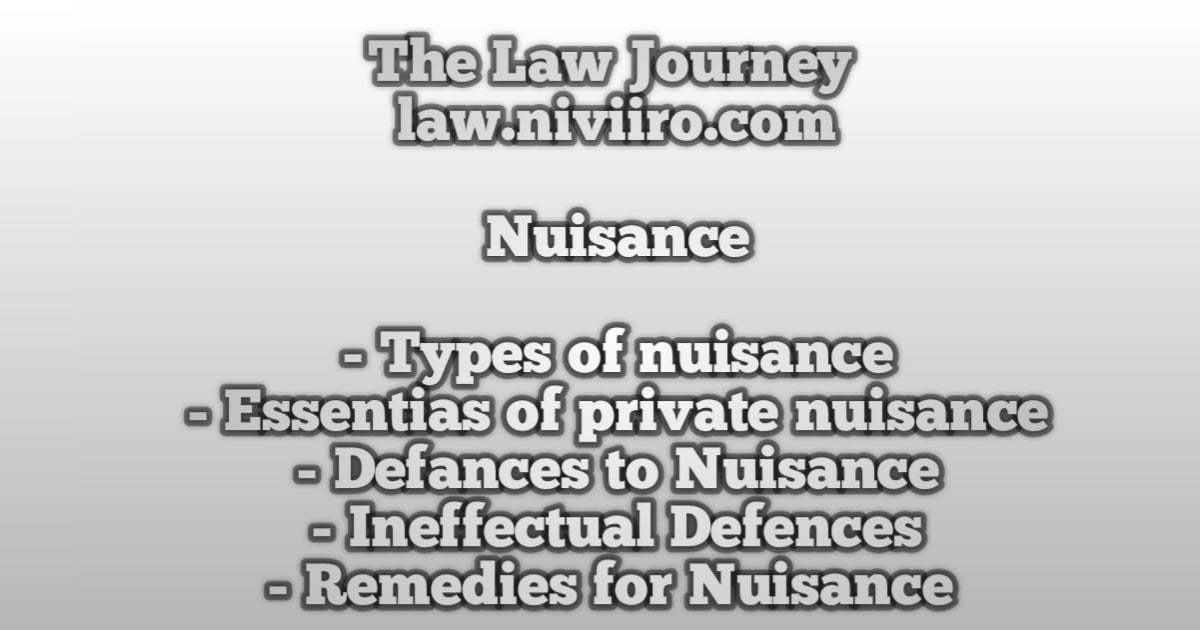(The Course of Employment) A master, like a principal, is liable for every tort which he actually authorizes. The liability of a master is not limited only to the acts which he expressly authorizes to be done but he is liable for such torts also which are committed by his servant in the course of employment.
An act is deemed to be done in the course of employment, if it is either : (1) a wrongful act authorized by the master, or (2) a wrongful and unauthorized mode of doing some act authorized by the master.
So, a master can be made liable as much for unauthorized acts as for the acts he has authorized. However, for an unauthorized act, the liability arises if that is within the course of employment, i.e., it is a wrongful mode of doing that what has been authorized.
We will study the relationship of master and servant under the following heads:
(i) Lending a servant, (ii) Theft by servant, (iii) Carelessness of servant, (iv) Outside the course of employment, (v) Delegation of duty by servant, (vi) Servant and independent contractor, (vii) Mistake of servant, (viii) Lift to an unauthorized person, (ix) Express prohibition by master, (x) Fraud of servant.
Lending a servant
Sometimes an employer lends his servant to some other employer for a particular purpose or for a period of time. If, in such a case, if the servant injures a third party then the question arises who will be vicariously liable – First employer or the second employer?
This question can be answered on the basis of an important case of Mersey Docks and Harbour Board v. Coggins and Griffiths (Liver Pool) Ltd., (1847) 1 AC 1, which was decided in the year 1947 by the House of Lords: In this case, the appellants hired out a crane to the respondents for the purpose of unloading a ship. A driver was also provided to the hirer on the condition that he will be the servant of the hirers for the contract period.
The hirer didn’t have any control over the driver vis-a-vis his actual management of crane. During the unloading of ship, the driver injured a person by negligent working of the crane. It was the observation of the house of Lords that the appellants as the general employer of the driver were liable to injured person.
Theft by servant
Theft of goods bailed to the master In Cheshire v. Bailey, it was held that if the servant committed a theft of a third person’s property which had been bailed to the master, the master could not be vicariously made liable for the same because the servant’s act of committing the theft was considered to be outside the course of employment.
This decision was overruled by the Court of Appeal in 1965 in Morris v. C.W. Martin & Sons Ltd. In this case, the defendants were the bailees of a fur coat given to them for cleaning. They gave this coat to their servant, Morrisey for cleaning. Morrisey stole the coat instead of cleaning the same. It was held by the Court of Appeal that the act of the servant in stealing the coat, to whom the same had been entrusted for cleaning, was a wrongful act done in the course of employment and the master, i.e., the defendants, could be made liable for the same.
Carelessness of servant
Sometimes, wrong may be committed due to negligence of servant. In Century Insurance Co. v. Northern Ireland R.T. Board, 2942 AC 509, the respondents were insured by the appellants against damage arising from the use by the respondents of their petrol tankers. One driver working under respondent, lit a cigarette while delivering petrol at the garage and threw the match box upon garage floor. It caused explosion and the property was damaged.
The appellant raised the plea that the driver was outside their employment hence they were not liable. But, the Law Lords held that though the driver lighted the cigarette for own purpose, it was a negligent method of conducting his work.
The Law Lords also followed the dissenting opinion in Williams v. Jones, (1865) 3 H&C 602 and held the appellants liable as the driver’s negligent act was within the course of his employment.
Outside the course of employment
There are so many factors to be considered first before deciding that a particular act is or not within the course of employment. In committing a tort, the servant acts for his own benefit and not for his master’s, the latter should not be held liable as it was held in Barwick v. English Joint Stock Bank, 1867 LR 2 Exh 259.
In Lloyd case it was observed that master holds servant out as his representative and if in this capacity, the servant opted to enrich himself at the expenses of others, it is correct to hold the person liable is who placed him in a position to do so. In K.B. Co. v. Saad Bin Ahmad, it was observed that even though an act be done in the general course of employment still it may not render the employer vicariously liable if it is uncalled for or is excessive.
Delegation of Duty by Servant
A servant may delegate his duty in certain circumstances. If a servant has got the authority from his master to delegate his duty in real emergency at the time when his master is not available to give permission, the person to whom he delegates the duty then the master will be liable for his negligence also. Even, if a servant has delegated his duty to another and that person commits negligence then the master will be held liable not because that the person who was appointed/delegated has committed the negligence but his servant has delegated his duty to another person during the course of employment.
In Ricketts v. Thomas Tilling Ltd., (1915) 1 KB 644, the driver of the bus permitted the conductor to drive the bus and turn the bus in right direction for next journey. The driver was sitting by the side of conductor. The conductor drove the bus negligently and knocked down the plaintiff. The Court held that the defendant was not liable for conductor’s negligence but was liable for the act of driver who wrongly delegated his duty to conductor in course of employment.
Servant and independent contractor
A servant is under the total control of his master. What he has to do and how it has to be done are decided by the master. Exceptions are where the work is technical or professional and the master is incompetent to supervise e.g., – surgery, pilot’s job etc. Whereas an independent contractor is different from servant and agent. He is under a ‘contract for service’ i.e., ‘what is to be done’, ‘how it is to be done’ is in the hands of independent contractor completely. Since the independent contractor is free to choose his way to accomplish his job, his master is generally not liable for any tort committed by independent contractor.
In B. Govindarajulu v. M.L.A. Govindaraja Mudaliar,after a motor lorry was entrusted by its owner for repairs, while an employee of the repair workshop drove it, there was an accident. It was held by the Madras High Court that for this accident, the owner of the lorry was not liable vicariously, because the owner of the workshop was an independent contractor and not the servant of the lorry owner.
Distinction between Servent & Independent Contractor
| SERVENT | INDEPENDENT CONTRACTOR |
| 1. Master would liable for the tort of servent. | 1. Master would not liable for the tort of independent contractor. |
| 2. There are less freedom then independent contractor. | 2. There are more freedom then servent. |
| 3. Servent is under direction and in the control of the master. | 3. There are not any direction and control on independent contractor. |
| 4. Servent under employment contract. | 4. Independent contractor under contract of service. |
Mistake of Servant
During the course of employment, if a servant commits any wrong then the master shall be held liable. In Bayley v. Manchester Sheffield and Lin Rly., 1882 LR 7 CP 415, it was the duty of porter of the Railways (defendant) to prevent passenger from getting into wrong train but a porter of defendant under erroneous belief that plaintiff was sitting in a wrong train pulled the plaintiff out of the train. The Court found the porter wrong and held the defendant liable for the servant’s errors of judgment.
Lift to an unauthorised person
In Pushpabai Purshottam Uderhi v. Ranjit Ginning & Pressing Co. Pvt. Ltd., MANU/SC/0249/1977 : AIR 1977 SC 1735: (1977) 2 SCC 475: (1977) 3 SCR 372, the Manager of the Company was going to Pandhorna from Nagpur on a business trip. He also took another employee of company, Purshottam with him. The car met with an accident and Purshottam died. The manager was driving the car at the time of accident.
It was the view of the High Court that the manager in taking the deceased as a passenger was not acting in the course of employment. But Hon’ble Supreme Court reversed this decision with remarks that in present case a responsible officer of the company, the manager, had permitted Purshottam to have a ride in the car. Taking into account the high position of the driver who was the manager of the company, it is reasonable to presume, in the absence of any evidence to the contrary, that the manager had authority to carry Purshottam and was acting in the course of employment.
Express prohibition by master
Sometimes, a master prohibits his servant to do certain acts and if the servant does the acts in defiance of the order as given by his master then his act can be said to have been done outside the course of employment and the master may not be liable.
In Limpus v. London General Omnibus Co., (1862) 1 H&C 526, the driver of a bus was prohibited by his employers from obstructing buses of rival companies, and, in contravention of this order, driver obstructed one of the buses and overturned it. The master was held liable for the act of errant driver as at the time of accident, he was doing what he was employed to do.
Fraud of Servant
During the course of employment under a master, if the servant commits any fraud then the master would be liable.
In Lloyd v. Grace Smith & Co., 1912 AC 716, the plaintiff had a small cottage and some money which was due on a mortgage to the tune of Å“ 1,000 approached the manager of a solicitor’s firm for advice on how to increase her money. The manager advised her to sell the cottage. The plaintiff authorized the manager to sell the cottage. The manager sold the cottage and absconded with money. The Court held that the firm would be held liable for all the frauds committed by its servants since the servant was acting within the course of employment.
In State Bank of India v. Shyama Devi,it was held that if a customer of the bank gives some amount or cheque to the bank employee (in his capacity as a friend) for being deposited in the account, without obtaining any receipt for the same, the bank employee is not deemed to be acting within the scope of his employment. If such an employee misappropriates the amount or proceeds of the cheque for his personal gain, the bank cannot be made liable for the same, because the act of the servant in this case has been done outside the course of employment.
The scope of employment
It is a fact that one man in legal sense the ‘servant’ of another does not in itself render the ‘master’ liable for any or every tort which the servant may commit. Master can only be held liable vicariously for such torts which are committed by the servant in the course ofemployment.
An act is said to be done in the course of employment when the servant executes the order of the master: (a) The master has ordered the servant to commit a wrongful act, or (b) wrong may be committed due to the servant’s negligence while carrying out the orders of the master. In the first case, master’s order is itself wrongful. For example, if master asks his servant to throw garbage on other’s land, the master will be held liable.
In the second case, if master asks driver to drive his car and the driver drives the vehicle negligently, or where a clerk who was permitted to use a lavatory and who left the tap open which flooded the lower premises. These acts are considered within the course of employment. Such cases comes within the purview of ‘respondent superior’ i.e., superior is responsible or let the principal be liable.
Doctrine of Common Employment
This doctrine is an exception to the rule of vicarious liability. In Priestly v. Fowler, (1837) 3 M&W 1, it was held that a master was not liable for the negligent act committed by one servant to another fellow-servant acting in the course of employment. So, the doctrine of common employment is a defence for that employer who is able to prove that- (i) the wrongdoer and the injured person are fellow-servants under him, and (ii) at the time of accident they are engaged in common employment. This doctrine was abolished by the Law Reform (Personal Injuries) Act, 1948, in England.
But this doctrine is still in vogue in India although its scope has been limited by the Employer’s Liability Act, 1939; the Workmen’s Compensation Act, 1923; the Employees State Insurance Act, 1948 and the Personal Injury (Compensation Insurance) Act, 1963. Although its scope has been limited by the above Acts but it needs to be abrogated.
Related Post
Distinction between Servent & Independent Contractor ?
1. Master would liable for the tort of servent whereas Master would not liable for the tort of independent contractor.
2. There are less freedom then independent contractor whereas There are more freedom then servent.
3. Servent is under direction and in the control of the master awhereas there are not any direction and control on independent contractor
4. Servent under employment contract whereas Independent contractor under contract of service
What do you mean by Doctrine of Common Employment ?
This doctrine is an exception to the rule of vicarious liability. In Priestly v. Fowler, (1837) 3 M&W 1, it was held that a master was not liable for the negligent act committed by one servant to another fellow-servant acting in the course of employment. So, the doctrine of common employment is a defence for that employer who is able to prove that- (i) the wrongdoer and the injured person are fellow-servants under him, and (ii) at the time of accident they are engaged in common employment……
References
- P.S.A. Pillai’s – Law Of Tort
- Universals Law of Torts
- A.K Jain law of torts
- Law of Torts by Ratanlal and Dhirajlal
- Law of Torts by J.N. Pandey
- Law of Torts by RK Bangia (22nd Edition)

















